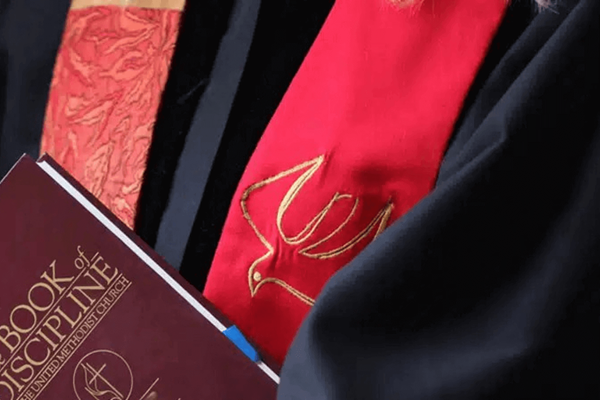Annual conferences are strongly encouraged to ratify the constitutional amendment to Paragraph 35 (Ballot #4) because it standardizes and clarifies who is eligible to vote for clergy delegates to General Conference. While it does not change eligibility requirements from what is already detailed in other places in the Book of Discipline, it ensures that:
- A Master of Divinity (M. Div.) must be from a University Senate-approved theological school (or equivalent in Central Conferences), aligning Paragraph 35 with existing standards in Paragraphs 324 and 602.1.d.
- The language used is more precise and consistent with the rest of the Book of Discipline.
- It creates uniform educational standards for voting clergy across the global church, avoiding confusion or unequal application of qualifications.
Without ratification, educational and voting standards would remain adaptable and inconsistent, potentially allowing clergy with differing educational backgrounds to vote under varying interpretations across the denomination.
Talking Points for Constitutional Amendment to ¶ 35
Talking Ratification Process (¶ 60)
The postponed 2020 General Conference voted to amend Section VI, Article IV (¶ 35) of the UM Constitution. Because an amendment to ¶ 35 will change the constitution, it must be voted on by each annual conference. This amendment is on ballot #4. To be ratified, this amendment must be passed by two-thirds of the aggregate votes from across the denomination
Amendment
¶ 35. Article IV. The clergy delegates to the General Conference and to the jurisdictional or Central Conference shall be elected from the clergy members in full connection and shall be elected by the clergy members of the annual conference or provisional annual conference who are deacons and elders in full connection, associate members and those provisional members who have completed all of their educational requirements and local pastors who have completed course of study or an M. Div. a Master of Divinity degree from a University Senate-approved theological school or its equivalent as recognized in a central conference and have served a minimum of two consecutive years under appointment immediately preceding the election.
Purpose and Rationale
The amendment’s purpose is to clarify and contextualize, and to mirror current educational standards expressed in other places in the Discipline, and to not expand, restrict, or change current educational standards for clergy members charged with electing clergy delegates to the General Conference by:
- Replacing an abbreviation with the full term.
- Substituting “Master of Divinity” for “M. Div.” is a grammatical revision to reflect the formal writing style of the Book of Discipline.
- Clarifying a Master of Divinity degree should be earned through a University Senate-approved theological school.
- This addition mirrors current educational standards in ¶ 324 and current voting qualifications in ¶ 602.1.d, which require a qualifying M. Div. be earned from a University Senate-approved school or its equivalent.
- Without clarification, one could argue an M.Div. from any institution will qualify a licensed local pastor to vote. Because a qualifying M. Div. for elders and deacons must be earned through a University Senate-approved school, this clarifies education parity for all clergy.
- Current educational standards in ¶ 324 are adaptable in the Central Conferences. Constitutional paragraphs are not adaptable. Amending ¶ 35 creates a consistent educational standard for all clergy members.
- Allows for a contextualized equivalent to the University Senate.
- Regional/Central Conference equivalents to the University Senate are developing across the connection. These associations consider appropriate educational standards for their respective contexts.
____________________________________________________________________________________
Frequently Asked Questions
-Because the University Senate is named, does this amendment establish it as a constitutionally mandated institution?
No. The Book of Discipline requires the existence and work of the University Senate in ¶ 324 with its shape and authority defined in ¶ 1409. This amendment does not grant the University Senate authority beyond the responsibilities it currently possesses.
The Book of Discipline is a living document. If necessary, the General Conference can modify the University Senate’s work or revise the church’s relationship with it.
-Because its provisions are provided for in the Book of Discipline, is this amendment necessary?
Educational standards for clergy are listed in ¶ 324 and are adaptable across the Central Conferences. Clarifying educational standards in ¶ 35 will create a denominational standard for those who are qualified to vote for General Conference clergy member delegates.
-What happens if this amendment revision is not ratified?
Not ratifying this amendment will allow all educational standards to be adaptable, creating inconsistent educational standards across the denomination for those seeking to vote for General Conference clergy member delegates.
-Does this amendment make it more difficult for licensed local pastors to qualify to vote?
No. Licensed local pastors still qualify to vote by completing Course of Study or completing an M. Div. This amendment mirrors the voting qualifications already detailed in ¶ 602.1.d and brings ¶ 35 into consistency with the denominational standard that an M. Div. must be earned at a University Senate-approved theological school, in alignment with the M. Div. standard for elders and deacons (¶ 324) and current voting qualifications for clergy who are given the responsibility to elect delegates (¶ 602.1.d).
This content was originally published by the General Board of Higher Education and Ministry; republished with permission by ResourceUMC on May 12, 2025.

